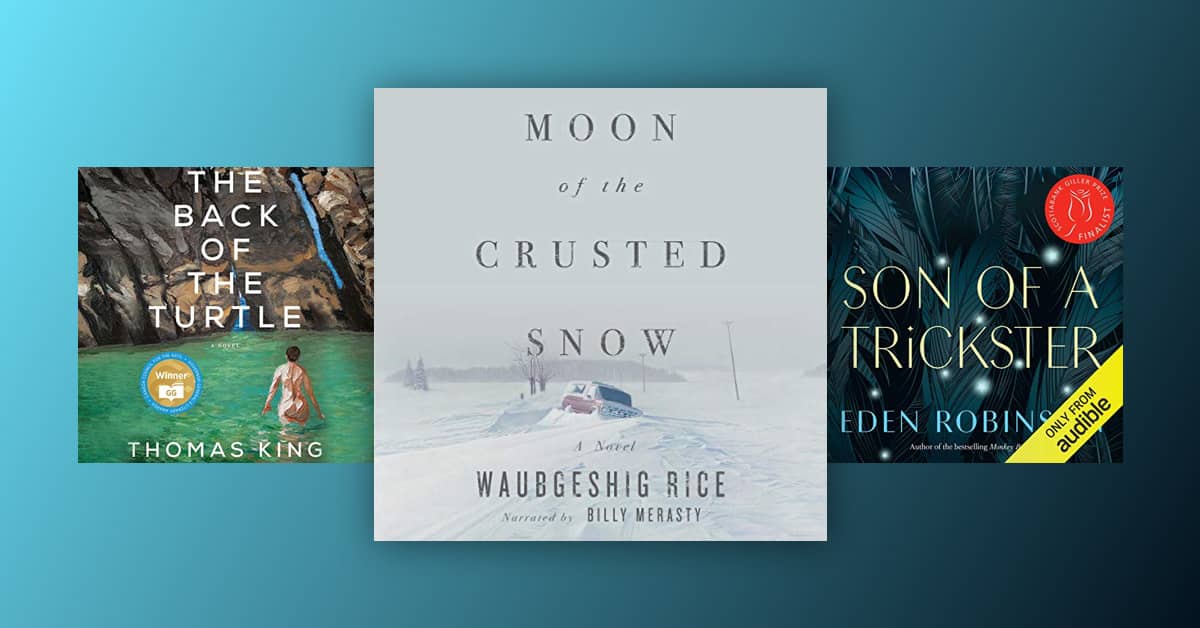The best nonfiction audiobooks take involved, often intimidating subjects and reinvigorate them with sharp narration so you can stay focused and on track. In this list, we’ll share our picks for some of the best nonfiction audio out there, encompassing a wide array of topics—from the entire history of humanity to astrophysics to the American prison system. No matter your preference, our list will keep you engaged with some of the most fascinating, deeply human real-life stories our catalogue has to offer. Here are our picks for the best nonfiction audiobooks.
Tracking humankind from its origin (that’s more than 70,000 years ago!) is no easy feat, but it’s exactly what author Yuval Noah Harari does with deft precision in Sapiens: A Brief History of Humankind. Focusing on the appearance of modern cognition, Harari tracks the evolution of humans and why five other species went extinct. He breaks up our history into four key areas: the evolution of imagination, the introduction of agriculture, the emergence of politics and organizations, and the rise of science. With the help of Audie Award winner Derek Perkins’s clear and authoritative narration, this listen’s wide scope remains easy to digest in a way that stays engaging and thoughtful throughout.
You may know Trevor Noah as the host of The Daily Show, but before he took the late-night television world by storm, he was busy learning to become a storyteller and satirist in South Africa during the end of apartheid. Noah was born to a white father and black mother—a union that was, at the time, punishable by five years in jail. In his author-narrated memoir Born a Crime, he tells his origin and coming-of-age story. This listen is full of mischievous childhood anecdotes, in addition to more serious tales about survival, painting a complex picture of what it was like to grow up in a time and place where your very existence was outlawed. Noah is a comedian at heart, and his jokes, wit, and storytelling soar. His spot-on accents, superb impersonations, and shining personality as he performs this audio are what make listening so enjoyable—and what earned him the 2018 Audie Award for Best Male Narrator.
After years of surviving in a Nazi death camp, neurologist and psychologist Viktor Frankl developed logotherapy, an approach based on his experiences. In Man’s Search for Meaning, listeners will hear harrowing details about Frankl’s experience in four different concentration camps before learning about the origins of logotherapy, which centers around a core belief that our primary motivation is a search for meaning. This powerful, necessary listen encourages us to understand Frankl’s suffering while acknowledging his brilliant, human-focused research. Hall of Fame narrator Simon Vance delivers this performance with weight and seriousness, while still soothing the listener during the more painful retellings.
What makes one person successful and another not? This question is the driving force behind Malcolm Gladwell’s Outliers: The Story of Success, a study that suggests we pay far too much attention to personality and individual traits in successful people, and should instead look at a person's background. A journalist and public speaker, Gladwell elevates his text to essential listening. As he explains the rule of 10,000 hours of practice or why cultural traditions determine how good of a pilot someone may be, you feel like you’re being taught as you listen, coming to conclusions just as Gladwell does. Blending anecdotes and evidence, this audiobook makes it easy to grasp key takeaways without feeling overloaded.
Bill Bryson’s A Short History of Nearly Everything is exactly what it sounds like—one man’s quest to understand how we came from nothing to become what we are today. Going from the Big Bang to the rise of society, Bryson travels to all corners of the world to question experts and build out his work. In this unabridged edition, narrator Richard Matthews takes on this impressive history and makes it feel breezy. Together, Bryson and Matthews make an enormous history feel entertaining and easy to comprehend.
In 1943, an Army Air Forces bomber crashed into the ocean and disappeared. A lieutenant by the name of Louis Zamperini survived, and in Laura Hillenbrand’s Unbroken: A World War II Story of Survival, we learn about his unbelievable journey from the shark-infested waters of the Pacific to the brutal prison camps of the Japanese-occupied Marshall Islands to, at long last, his return to American soil. Hillenbrand’s thorough research is further complemented by narrator Edward Herrman, who tells the story with care and passion, weaving anecdotes and world history together seamlessly with a balance of emotion and straightforward, knowledgeable delivery.
Maya Angelou’s autobiography, I Know Why the Caged Bird Sings shares the early life and childhood of the author and poet. And there’s no better way to enjoy these vivid, dramatic tales—both in their humor and intensity—than hearing them in Angelou’s own voice. Her retellings are so genuine that this listen feels like a relative is sharing childhood memories with you. While the stories may sometimes be difficult to hear, Angelou’s boldness and honesty in discussing her past make this moving memoir well worth the listen.
If you’re usually a fan of historical fiction, Erik Larson’s Dead Wake: The Last Crossing of the Lusitania offers an intriguing, suspenseful way to dive into nonfiction. Told through anecdotes and accounts from different passengers, Larson’s work humanizes both sides of WWI’s central conflicts and brings to light lesser known stories about the ill-fated passenger ship. Audie Award winner Scott Brick is no stranger to Erik Larson’s work. Having previously narrated the equally excellent The Devil in the White City, Brick brings his experience of performing narrative nonfiction with expert pacing to this listen. He chooses precise moments to bring dramatic flair to the content, adding additional intrigue to his soft, subtle narration.
Like many nonfiction works on this list, Ron Chernow’s Alexander Hamilton sets out to do what seems impossible—condensing a rich, detailed period of history, plus the feats and flaws of a legendary figure, into a single work. While many biographers focus on snippets of Hamilton’s life, Chernow paints a full picture, all the while keeping listeners entertained. Scott Brick’s professional performance endures through the entire 36-hour experience. Dubbed the ''man with a golden voice,'' Brick keeps his narration varied and engaging, bringing you all the way through to the end of this audiobook feeling just as interested as you did in the beginning. For fans of the Broadway hit eager to learn more about its fascinating subject, this listen is well worth the investment.
Astrophysics is not typically considered a light or easy topic you can learn on your way to work, but Astrophysics for People in a Hurry changes that. Perfect for fans of Cosmos by Carl Sagan (a man who was also known for making difficult scientific concepts digestible), Neil deGrasse Tyson’s work takes complex questions about our universe and answers them in an equally easy-to-understand way. Discussing topics like gravity, speed and light travel, and dark matter, Tyson’s genial, chatty tone takes away the intimidation and makes you feel like a friend is explaining everything to you, making this the perfect listen for stolen moments throughout a busy day.
If you wish you knew more about American history without having to go back to school, then 1776 by David McCullough is one of the best ways to bring you up to speed. It focuses on the events that led to the start of the American Revolution. The work doesn’t just discuss General George Washington either, but takes a deeper look at lesser-known historical figures such as King George III and Henry Knox to provide a well-rounded perspective. McCullough’s narration of his own work will further stir your interests. With his expertise and heavy research on the subject coupled with a marked interest in the topic, you’ll have no trouble following along as he passionately retells American history.
When Breath Becomes Air begins with author Paul Kalanithi being diagnosed with stage IV lung cancer at the age of 36. A renowned neurosurgeon, Kalanithi is forced to face his own mortality and many of the follow-up questions that come with it. Throughout this autobiographical work, Kalanithi explores questions including death and morality, raising children, and career development. Sunil Malhotra maintains the straightforward and practical tone of a doctor through his narration, mirroring the story’s tone and author. But what makes this performance even more special is the epilogue performed by Hall of Fame narrator Cassandra Campbell, who shares the words of Kalanithi's wife. The transition from the clinical, methodical medical world to the emotional recollections of a widow creates a truly touching, affecting listening experience.
Michelle Alexander’s The New Jim Crow takes on the epidemic of mass incarceration that perpetuates the cycle of prejudice and unfairly targets black men. Alexander’s argument is that this system is a modern extension of the Jim Crow laws that enforced segregation in the 19th and 20th centuries. While many believe state-sanctioned discrimination ended with the civil rights movement, Alexander argues that the United States prison system operates in an eerily similar fashion to those oppressive laws from decades prior. Narrator Karen Chilton takes the dark, bitter truths from this work and delivers them in a somber but engaging way. Her style imitates that of a radio broadcaster, emulating the authoritative and informative tone of the work.
In 48 Laws of Power, author Robert Greene aims to simplify 3,000 years of advice on power and leadership into 48 straightforward laws. Whether you’re interested in leading a personal project, company, or something much larger, this study on the likes of Machiavelli and Sun Tzu will offer simple truisms you can take with you in all parts of your life. Richard Poe’s narration swiftly shifts between different tones for different characters, breathing life into the diverse range of stories. With simple vignettes to paint the picture and short chapters to keep you on track, you can begin to internalize key learnings like "enter with boldness” to help you prepare for your next important meeting.
Published nearly 90 years ago, How to Win Friends & Influence People by Dale Carnegie is still considered one of the best self-help titles on the market. Each lesson in this timeless gem is distilled into a memorable list with Carnegie tackling subjects from how to make people like you to how to be a leader—even how to be happier. This listen is further enhanced by Andrew MacMillian, who allows the text to shine by never over-delivering, while still conveying enthusiasm in his performance. His narration lets Carnegie’s classic work speak for itself, adding flourishes that make the experience all the better.
You may be familiar with the Oscar-nominated 2016 film adaptation of this unforgettable story, starring Taraji P. Henson, Octavia Spencer, and Janelle Monáe as the three African American women mathematicians hired to work for NASA years before the civil rights movement. Hidden Figures by Margot Lee Shetterly is the story of Katherine Johnson, Dorothy Vaughan, and Mary Jackson, the "computers" who served as the brains behind the operation that made John Glenn the first American to orbit the globe. Hall of Fame narrator Robin Miles lends her warm, rhythmic tone to this tale of smart women challenging discrimination in a very segregated Virginia, relying on their intellect and sheer strength of will to accomplish one of the greatest feats of scientific genius in American history.
Between the World and Me by Ta-Nehisi Coates is told as a series of letters to his son—which makes hearing Coates read his work aloud all the more powerful. Charged with emotional honesty, this listen is infused with warmth and love, though the stories it tells are often quite difficult to listen to. Throughout his audiobook, Coates addresses the challenges of being Black in a political and social climate teeming with racial tension. His boldness in facing America’s racist history while also imagining the possibilities for a better tomorrow culminate in a stunning, anguished listen.
A best seller for more than a decade, The Four Agreements by don Miguel Ruiz uses Toltec wisdom to teach us how to be happier and remove the negative forces in our lives. With just four simple agreements, Ruiz offers an easy code for us to live by: say what you mean, don’t take things personally, don’t make assumptions, and always try to do your best. Actor Peter Coyote’s passionate delivery makes each ancient gem of wisdom accessible and understandable. His performance feels like a friend offering advice, a warm delivery that ensures the staying power of each agreement.
Renowned sex therapist Esther Perel has helped hundreds of couples bring passion to their home lives. In Mating in Captivity, Perel explores our relationship with both domesticity and eroticism, highlighting how the two are inherently at odds with one another. Using her experience as a therapist, Perel’s own narration makes listening feel both calming and enlightening. As you hear different stories and lessons, Perel will help you question the social norms you bring home—and provide a plan for how to shake them up.
In 1959, in a small town in rural Kansas, the Clutter family was savagely murdered. There was no apparent cause or reason, or any clues for the police to track. In Cold Blood was Truman Capote’s response—a true crime classic that aims to reconstruct the murder and investigation. Unshakable and disturbing in its delivery, this listen introduces us to the two ex-convicts who committed the crime, offering both empathy and suspense for a complex listen. This is further emphasized by Hall of Fame narrator Scott Brick’s performance. He doesn’t attempt any overblown accents, nor does he over-dramatize the situation. Instead, Brick delivers the retelling with compelling simplicity, letting each detail linger.
























